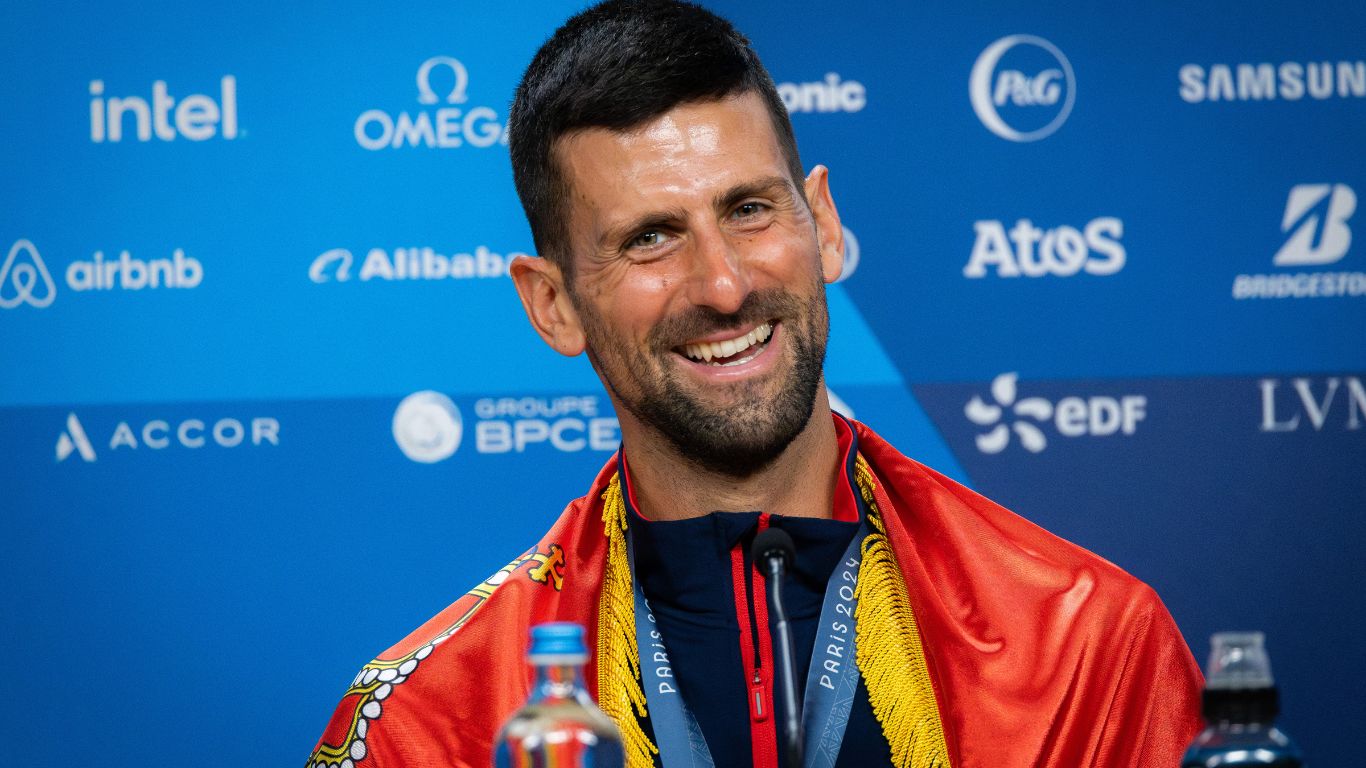In a recent development, a prominent Australian broadcaster issued an apology to tennis star Novak Djokovic after a controversial broadcast sparked a wave of public backlash. This article delves into the incident, the broadcaster’s apology, Djokovic’s response, and the broader consequences for both the Australian media landscape and the world of sports journalism.
Outline
- Introduction
- A brief overview of the situation and its significance.
- What Triggered the Controversy?
- The content of the broadcast that led to the apology.
- A Look at Novak Djokovic’s Career
- Key achievements and Djokovic’s status in tennis.
- The Importance of the Apology
- The impact of the broadcaster’s acknowledgment of the mistake.
- Public Reactions
- How the public, fans, and other athletes responded.
- Djokovic’s Reaction
- His perspective on the apology and the media’s treatment of him.
- The Media’s Role in the Controversy
- Analysis of Australian media’s relationship with Djokovic.
- Legal Implications of the Apology
- The potential legal ramifications of the broadcaster’s actions.
- Impact on Djokovic’s Career
- Whether the controversy will affect his future in tennis.
- Ethics in Sports Journalism
- A discussion on media responsibility in covering athletes.
- Lessons for Media Outlets
- What broadcasters and journalists can learn from this incident.
- Implications for Australian Broadcasting
- The effects of this controversy on the broadcaster’s reputation.
- Fan Support for Djokovic
- How Djokovic’s fans have responded to the apology.
- Media and Athlete Narratives
- The influence of the media on how athletes are perceived.
- Conclusion
- A summary of the situation and its broader implications.
What Triggered the Controversy?
The controversy began when an Australian broadcaster aired a segment that many viewers deemed biased and unfair to Novak Djokovic. The broadcast’s tone was perceived as negative and dismissive of Djokovic, which sparked significant public backlash. Djokovic, already a divisive figure due to his outspoken opinions on various issues, became the subject of criticism once again. This led to widespread outcry from fans, athletes, and commentators who felt that the broadcaster had acted irresponsibly.
As a result of the intense public reaction, the broadcaster was compelled to issue an apology. The apology acknowledged the damage caused by the broadcast and promised a commitment to more balanced and fair reporting in the future.
A Look at Novak Djokovic’s Career
Novak Djokovic is widely regarded as one of the greatest tennis players in the history of the sport. With numerous Grand Slam titles to his name, Djokovic has cemented his legacy as a dominant force in tennis. However, his career has not been without controversy. He has been criticized for his views on various political issues, including his stance on vaccinations, which has sparked heated debates among fans and the media.
Despite the controversies, Djokovic’s skill on the tennis court and his unwavering determination have made him one of the most respected and successful athletes in the world. His influence extends beyond tennis, and his personal beliefs often stir up strong reactions, whether positive or negative.
The Importance of the Apology
The apology issued by the broadcaster was an important step in addressing the damage caused by their biased coverage. The media has a significant impact on public figures, and when that influence is used irresponsibly, it can result in harm to an individual’s reputation. In this case, the broadcaster’s failure to provide fair and balanced coverage of Djokovic led to significant public backlash.
By issuing the apology, the broadcaster took responsibility for the controversy and expressed regret for their actions. While an apology alone cannot undo the harm caused, it was a necessary acknowledgment of the error and an effort to rebuild trust with the public.
Public Reactions
The reaction from the public was swift and varied. On social media, many fans of Djokovic came to his defense, criticizing the broadcaster for unfairly targeting him. Some commentators argued that Djokovic’s past actions had made him a target for such treatment, while others pointed out that the broadcaster’s bias was unwarranted.
The controversy also sparked a wider debate about media ethics and the role of the press in shaping public opinion about athletes. While many people stood by Djokovic, others felt that the broadcaster was justified in scrutinizing his actions. The situation highlighted the growing influence of social media, where public opinion can spread rapidly and influence the narrative surrounding high-profile individuals.
Djokovic’s Reaction
In his response to the apology, Novak Djokovic expressed his appreciation for the broadcaster’s acknowledgment of their mistake. However, he made it clear that he was focused on moving forward and not dwelling on the controversy. Djokovic stated that while he appreciated the apology, he was more concerned with continuing his career and maintaining a positive relationship with his fans.
His calm and measured response to the apology helped to defuse some of the tension surrounding the incident. By remaining focused on his professional goals, Djokovic demonstrated his resilience in the face of public criticism and media scrutiny.
The Media’s Role in the Controversy
This controversy underscores the significant role that the media plays in shaping the public perception of athletes. Throughout his career, Djokovic has been subjected to both positive and negative media coverage. The portrayal of public figures in the media can have a lasting impact on their image, and in this case, the broadcaster’s bias led to a backlash that could have been avoided with more impartial reporting.
The media has a responsibility to provide fair and balanced coverage, especially when reporting on sensitive issues involving public figures. This incident serves as a reminder of the power the media holds in influencing public opinion, and the need for ethical journalism in sports reporting.
Legal Implications of the Apology
In addition to the public backlash, there could be potential legal consequences for the broadcaster’s actions. If Djokovic felt that the broadcaster’s coverage had caused him reputational harm beyond the immediate backlash, he could pursue legal action. Defamation lawsuits are a common recourse for public figures who feel that they have been wronged by the media.
It remains to be seen whether Djokovic will take legal action, but the possibility of legal ramifications serves as a reminder of the risks associated with irresponsible media coverage.
Impact on Djokovic’s Career
While the controversy has sparked significant media attention, it is unlikely to have a long-lasting impact on Djokovic’s career. Djokovic has faced criticism and controversy before, and his ability to stay focused on his tennis has allowed him to continue succeeding in the sport. However, the constant media scrutiny could take a toll on his mental and emotional well-being.
This situation also highlights the pressure athletes face as public figures. While their professional achievements often speak for themselves, their personal views and actions are frequently scrutinized by the media, which can influence their public image.
Ethics in Sports Journalism
This incident serves as a powerful reminder of the importance of ethical practices in sports journalism. Journalists and media outlets must strive to maintain objectivity and fairness when reporting on public figures, especially in the case of athletes like Djokovic, who are often in the spotlight. The ethical obligations of journalists are crucial in ensuring that coverage remains accurate, respectful, and balanced.
The rise of social media has made it easier for the public to voice opinions about media coverage, and this controversy demonstrates the increasing need for media outlets to be mindful of their responsibilities.
Lessons for Media Outlets
The broadcaster’s apology provides important lessons for the media. First and foremost, it underscores the need for fairness in coverage. Media outlets should avoid sensationalism and ensure that they present all sides of a story. Journalists should also be aware of their potential influence on public opinion and be careful not to cross the line into bias or unfair criticism.
This incident also highlights the importance of accountability in journalism. When mistakes are made, media outlets must be willing to take responsibility and issue corrections or apologies where necessary.
Implications for Australian Broadcasting
For Australian broadcasting, this apology represents an opportunity to rebuild trust with the public. The broadcaster’s actions in the aftermath of the controversy will play a crucial role in determining how they are perceived by their audience. By issuing the apology, the broadcaster has taken the first step in addressing the damage caused by their biased coverage.
Moving forward, it will be important for the broadcaster to ensure that their coverage of public figures like Djokovic remains fair and objective. The apology alone may not be enough to restore the broadcaster’s reputation, but it is a step in the right direction.
Fan Support for Djokovic
Djokovic’s fans have shown overwhelming support in the wake of the controversy. Many fans took to social media to express their disappointment with the broadcaster’s treatment of their idol. Djokovic’s loyal fanbase has remained steadfast, with many reinforcing their support for him despite the media’s portrayal.
Fan support plays a significant role in an athlete’s ability to navigate public controversies. Djokovic’s strong relationship with his fans helps to buffer the effects of media criticism, allowing him to focus on his career and personal goals.
Media and Athlete Narratives
The media has a powerful influence on how athletes are perceived by the public. This incident highlights the extent to which media narratives can shape public opinion. The portrayal of athletes in the media can either enhance or damage their reputation, depending on the accuracy and fairness of the coverage.
As the media continues to play a central role in the lives of athletes, it is important for both journalists and public figures to understand the impact of media narratives. Athletes like Djokovic must learn to navigate the media landscape while maintaining their integrity and focus on their professional goals.
Conclusion
The apology issued by the Australian broadcaster marks an important moment in the ongoing relationship between media outlets and public figures. While the controversy surrounding Djokovic may not have a lasting impact on his career, it highlights the need for responsible and ethical journalism in sports.
As the media continues to shape the narratives surrounding athletes, it is essential that journalists strive to maintain fairness and objectivity in their reporting. For Djokovic, this incident serves as another challenge to overcome, but with the support of his fans and his resilience, he is likely to continue thriving in his career.
FAQs
- Why did the Australian broadcaster apologize to Novak Djokovic?
- The broadcaster issued an apology due to biased and unfair coverage of Djokovic, which sparked public backlash.
- How did Djokovic respond to the apology?
- Djokovic expressed appreciation for the apology but emphasized his focus on moving forward with his career.
- Will the controversy affect Djokovic’s career?
- It is unlikely that the controversy will have a lasting impact on Djokovic’s career, as he has weathered similar challenges in the past.
- What lessons can media outlets learn from this incident?
- Media outlets should strive for fairness and objectivity in their coverage, avoiding bias or sensationalism.
- What is the role of fans in this controversy?
- Djokovic’s fans played a crucial role in supporting him during the controversy, helping to mitigate the negative impact of media criticism.










